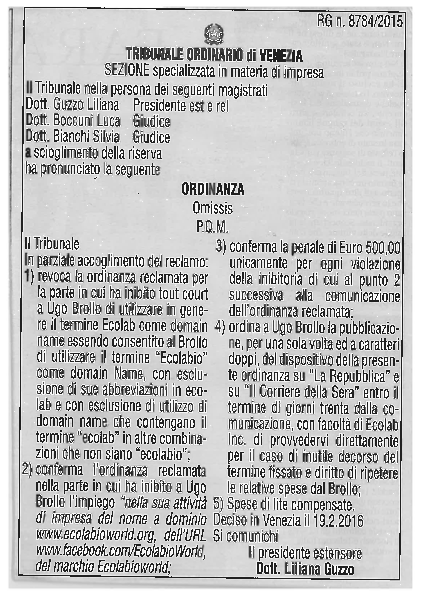THE ITALIAN NEWSPAPER “IL CORRIERE DELLA SERA” HAS PUBLISHED THE RULING OF THE JUDGEMENT HELD BY THE COURT OF VENICE – COMMERCIAL DIVISION – THAT AFFIRMED THE RENOWN OF THE TRADEMARKS “ECOLAB” AND DECLARED THE SIGN “ECOLABIOWORLD” AS INFRINGING WITH THEM.
15/11/2016
With the judgement published on May 12, 2016, the Court of Venice – Commercial division – ruled in favour of Ecolab Inc. and partially rejected the appeal against the decision of September 23, 2015, held by the same court in favour of the American multinational.
The appealed decision, taken at the end of an urgent proceedings promoted by Ecolab and aimed at the investigation of the infringement of its trademarks by the sign “Ecolabioworld”, had in fact inhibited the counterparty from using said sign within its business activity, the domain name www.ecolabioworld.org as well as in the Facebook page www.facebook.com/Ecolabioworld.
The board of appeal affirmed said decision, underlining that the trademark ECOLAB has acquired a high degree of renown and distinctiveness in the public of consumers. The second instance judges also reaffirmed that a high risk of confusion exists between the trademark ECOLAB and the sign “Ecolabioworld”, as in the comparison between two denominative signs the initial term (ECOLAB, in this case) significantly affects the memory of the consumer, while the remaining differences cannot be perceived as relevant. The addition of the words “io” and “world” to the challenged sign has been deemed conceptually unable to prevent a risk of confusion between the compared signs: it would be in fact inconceivable, the board of Venice affirms, that by seeing the sign “Ecolabioworld” the consumer is able to give a peculiar conceptual meaning to it, so as to distinguish it from the renowned trademark ECOLAB. Equally interesting is the part of the judgment where the Court of Venice has rejected the adverse request of acquiescence pursuant to Art. 28 of the Italian Code of Industrial Property, affirming that said principle does not apply to non-registered trademarks, as it necessarily requests the valid registration of the later sign whereof acquiescence is requested.

